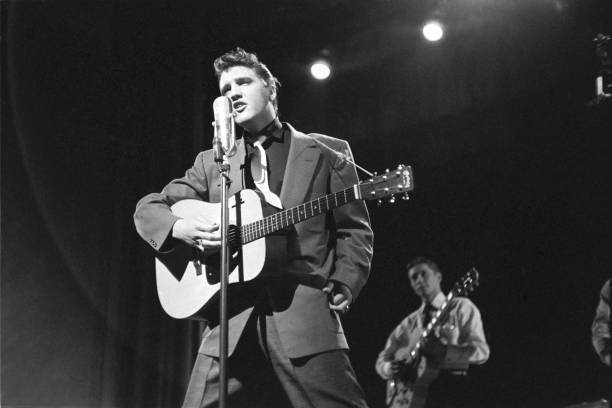 Introduction and Short Summary of the Song
Introduction and Short Summary of the Song
Released in 1966 as both a film title track and a soundtrack single, “Frankie and Johnny” is one of Elvis Presley’s most theatrical recordings. Based on a traditional American folk ballad dating back to the 19th century, the song tells the story of a doomed romance between a woman named Frankie and her unfaithful lover Johnny. Presley’s version was arranged with brassy, upbeat instrumentation to fit the lighthearted mood of his film Frankie and Johnny, even though the song itself has dark undertones of betrayal and violence. With its lively tempo, colorful arrangement, and Presley’s energetic delivery, the track bridges old folk tradition with mid-1960s pop entertainment.
Origins of the Song
The song “Frankie and Johnny” originated as a folk ballad in the late 1800s, inspired by a real-life murder case in St. Louis. Over the decades, it became one of America’s most enduring traditional songs, performed in countless variations by artists from Lead Belly to Sam Cooke. The story always centers on Frankie, who discovers her lover Johnny’s infidelity and, in most versions, kills him in a fit of jealous rage.
---> Scroll down for the VIDEO
When Presley’s film career called for another musical comedy in the mid-1960s, the folk ballad was adapted to serve as the title song. Presley recorded the track on May 14, 1965, at Radio Recorders in Hollywood, with new lyrics tailored to the movie’s playful storyline. The arrangement emphasized brass, piano, and theatrical flourishes, giving the song a vaudeville-like character rather than the dark gravity of its folk origins.
Why Elvis Released “Frankie and Johnny”
By 1966, Presley’s career was deeply tied to Hollywood. His movies were formulaic, often paired with soundtrack albums designed for commercial success. Frankie and Johnny was one such project, set aboard a riverboat and filled with musical numbers designed to evoke a playful, showbiz atmosphere.
---> Scroll down for the VIDEO
The title track was chosen as the film’s single release, issued in March 1966. It reached number 25 on the Billboard Hot 100, a respectable performance though not a major hit. Its release reflected RCA’s strategy of using movie songs to keep Presley on the charts, even when the material leaned more toward novelty than artistry.
The Message Conveyed in the Song
While the traditional folk ballad conveyed themes of betrayal, jealousy, and tragedy, Presley’s 1966 adaptation lightened the story for mass entertainment. The lyrics still depict Frankie discovering Johnny’s unfaithfulness, but the darker elements are softened, and the arrangement transforms it into a jaunty tale rather than a murder ballad.
Presley’s performance emphasizes humor and energy rather than tragedy. He delivers the lines with theatrical flair, supported by bold brass and backing vocals that frame the story in a more comedic light. The result is less a tale of heartbreak and more a playful retelling of an old American legend.
The Recording and Musical Characteristics
“Frankie and Johnny” reflects the soundtrack style of Presley’s mid-1960s output: polished, theatrical, and arranged to fit cinematic needs.
-
Vocals: Presley delivers the song with vigor, his phrasing crisp and dramatic. His playful tone matches the film’s atmosphere.
-
Instrumentation: The arrangement is dominated by brass, piano, upright bass, and percussion, evoking the sound of a riverboat band. The rhythm is steady and danceable, with flourishes that highlight the theatrical roots of the tune.
-
Backing vocals: The Jordanaires contribute harmonies and echoes that heighten the vaudeville feel.
-
Mood: Upbeat, colorful, and theatrical, the recording fits more within the tradition of show tunes than rock-and-roll.
-
Style: The track blends folk storytelling with pop-orchestral arrangements, making it suitable for both the film and radio play.
The result is a performance that feels larger than life, perfectly suited for its role in a musical comedy.
Cultural and Commercial Impact
Commercially, the single’s number 25 placement on the Billboard Hot 100 marked a moderate success for Presley during a period when his singles were often overshadowed by the British Invasion. In the UK, it charted more modestly, reflecting the growing competition Presley faced in the global music market.
Culturally, the song reaffirmed Presley’s role as a Hollywood entertainer in the mid-1960s. While his early rock-and-roll breakthroughs had redefined popular music, by this stage he was largely producing material tied to movies, often with a lighter, more comedic bent. “Frankie and Johnny” fit this mold perfectly, providing a cheerful showcase for Presley’s vocal charisma.
The film itself received mixed reviews, and critics often point to songs like “Frankie and Johnny” as examples of the formulaic nature of Presley’s Hollywood period. Still, fans enjoyed the film’s colorful presentation, and the title track helped maintain Presley’s presence on the charts.
Legacy of “Frankie and Johnny”
Today, “Frankie and Johnny” is remembered less as a major Presley hit and more as an example of his mid-1960s soundtrack style. While it does not carry the artistic weight of his later Memphis recordings or the raw energy of his 1950s hits, it remains an entertaining entry in his catalog.
For fans, the track serves as a nostalgic reminder of Presley’s Hollywood era, when his movies were lighthearted and filled with playful musical numbers. It also highlights his ability to adapt folk material into mainstream pop, even if the adaptation stripped away much of the original’s darker themes.
More broadly, the song underscores Presley’s versatility. Even when working within a formulaic film framework, he delivered performances with professionalism and charm. His version of “Frankie and Johnny” may not be definitive compared to traditional folk renditions, but it shows his knack for breathing life into any material given to him.
More than fifty years later, “Frankie and Johnny” endures as a fun, theatrical moment in Presley’s career. While not a towering hit, it remains part of the colorful tapestry of his soundtrack years, reflecting the entertainer side of the King of Rock and Roll.